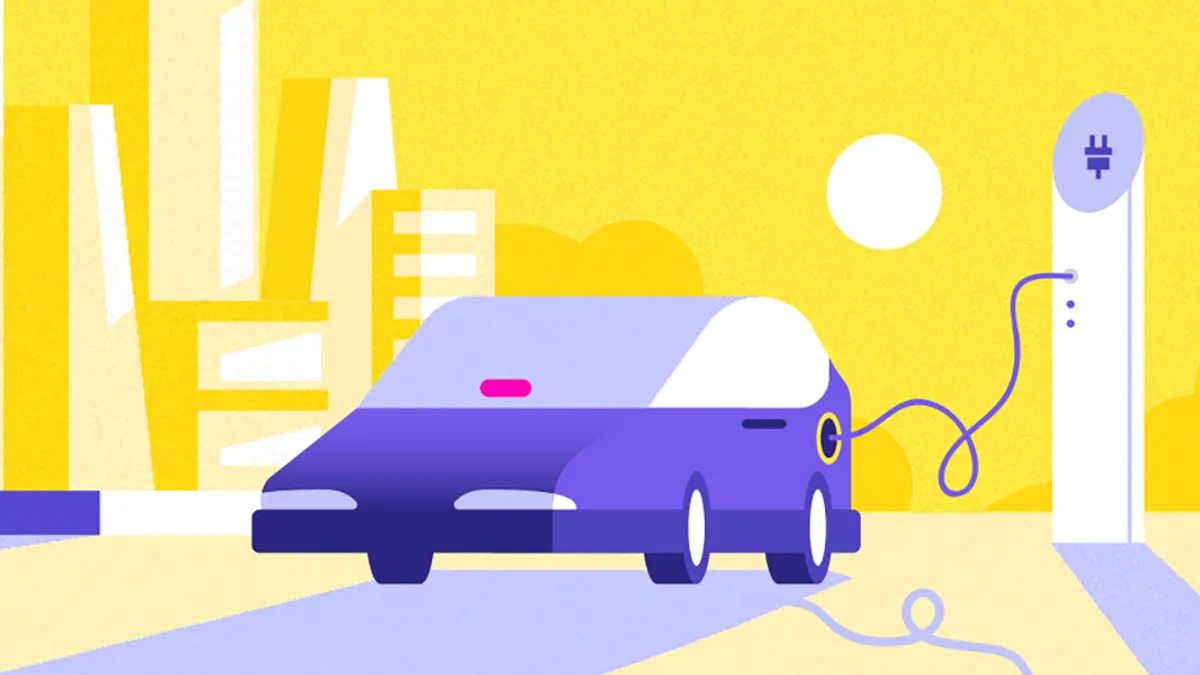Dive Brief:
- Lyft pledged on Wednesday for all vehicles on its platform to be electric by 2030, a move it said represented a "radical shift in strategy" that will save tens of millions of tons of greenhouse gas (GHG) emissions.
- The move to electric vehicles (EVs) will apply to drivers' personal cars, the company's Express Drive rental car partner program for drivers, the rental car program for riders and its autonomous vehicle (AV) program. Lyft said it would achieve this shift by "harnessing the power of the driver community" to reduce the cost of EVs, expand incentives and infrastructure and help drivers make the switch "in a way that is cost-effective, sustainable and profitable."
- Lyft will collaborate with the Environmental Defense Fund on its 100% electrification goal, and also joined The Climate Group's EV100 global electric mobility initiative. In a statement, The Climate Group said Lyft's membership "marks a major step forward in the transition to clean transport and making electric vehicles the new normal globally."
Dive Insight:
As cities grapple with how to get the climate crisis under control, Lyft said this commitment would help cut emissions and gasoline consumption dramatically. "Now more than ever, we need to work together to create cleaner, healthier, and more equitable communities," Lyft president and co-founder John Zimmer said in a statement.
Lyft not only has thousands of people using private cars to drive on its platform, but also runs an AV testing arm and various rental programs. Transitioning company-owned vehicles to electric may be more straightforward than getting drivers to do the same with their private cars, though the company says they will not immediately require a switch to an EV.
Instead, a company spokesperson told The Rideshare Guy and others, "we believe we can help make driving an EV a preferable choice and are committed to helping drivers transition to these types of cars over time." The company said if the price of EVs continues to drop and charging infrastructure expands nationally, then using a lower-emissions vehicle will become more attractive for drivers. They expect a slower ramp-up time to full electrification.
EV incentive programs and infrastructure expansion continue to be debated in Congress. The topic formed a key part of House Democrats' INVEST in America Act introduced earlier this month, which has been subject to a lengthy markup period in recent days in the House Transportation and Infrastructure Committee. That legislation, subject to amendments and a conference committee with the U.S. Senate, says it "dramatically increases" funding for charging stations and alternative fuels.
And Lyft said it has "already begun the work needed" for 100% electrification. The company trumpeted its efforts to add EVs to its Express Drive program in Atlanta, Seattle and Denver, noting that Colorado lawmakers' efforts to make Express Drive rental vehicles eligible for state tax incentives increased their attractiveness.
Lyft officials also threw down the gauntlet to their competitors in the transportation space, arguing that their efforts to fully electrify in 10 years "creates a path for others."
"If other rideshare and delivery companies, automakers and rental car companies make this shift, it can be the catalyst for transforming transportation as a whole," Zimmer said.












